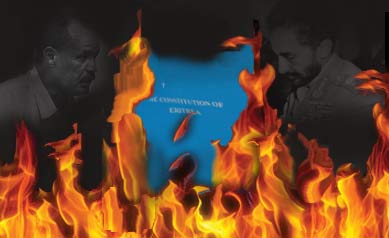On the Cynics and on the Frustrated

On the Cynics
You certainly have observed that now the time has come when the dead old demons are resurrected and its agents, seeing adventurous, optimistic Eritrea, at this time, standing amid its ruins, bewildered and confused, and although she knows perfectly well who the culprits were, she keeps bemusedly asking herself “whose fault is it?” in a sort of expression of awe and reprobation. But it took the agents of the old demons no time to misunderstand the expression and manage to have the audacity to point to the victim herself, screaming “You! It is your fault, you are responsible! ” They don’t forget, in the context, to slyly, and between the lines, to introduce themselves as the prophets to the lost world of the “Ethiopian Nirvana.”
These are charlatans and jugglers because they know that there is no question of Eritrea going back to Ethiopia now, not because of Eritrean reasons only (which are heavy and substantial), but also because of Ethiopian reasons as well, unless they are thinking of Tigrai-Tigrigna, and even that has its insurmountable ifs and buts. There is no doubt and, in fact, is clear from the get-go that there was no destination for the writings of Yosief Gebrehywet (“YG”) and his minions other than the fantastic and impossible Ethiopia. For them, the misery of Eritrea started with the revolution in 1961: only love and peace was prevailing over the land before that fateful day, they imply. They would like us believing that the 1st of September 1961 is the day in which everything began, the day of the cause of all causes, the big bang that nothing preceded. But they are lying through their teeth, claiming that. The revolution was never a cause, it was a result, and here lies the difference. It was the result of injustice, obstinacy and arrogance of the Ethiopian Empire and its collaborators whose ideology YG is championing and defending.
One can but only maintain that the contentions expressed by YG’s writings and his disciple, the power guy at Asmarino, are apologetic ideologies representing the world view of an Eritrean political class long since extinct, that theirs is the famous old wine in new bottles. The ideologues, by their own admission, are the counter revolutionary. We are not, here, speaking about the fops, the Gucci revolutionaries of the type IA is; we are speaking about a revolution which represented the aspirations of the Eritrean people, the people who rose and took up arms in defense of their hijacked fate by the Empire of Ethiopia and its Eritrean collaborating class which was holding the very same placards now risen high by YG and his disciples.
This class, which YG is defending, and whose ideology he trying to sanitize, is that same privileged political class through which the Amhara oligarchy was facilitating and imposing its rule on the rest of Eritrea. It was the class, the representatives of which misinformed, exhorted and lured the Emperor of Ethiopia into illegally dissolving the Federal arrangement between Eritrea and Ethiopia, and smash it against the advice of many well-meaning people, including that of Kennedy Trevaski of the British military administration in Eritrea, who prophetically warned in his book “Eritrea, A Colony in Transition” long before it happened, that if manipulation and exploitation of the federal arrangement by the Ethiopian crown is attempted, it will, most probably, bring about the destruction of the Ethiopian throne itself. He was right and the Eritrean elite and its advocates then were wrong, as they are now. This was the privileged class which was imprisoning people, killing them and forcing them to flee their homes and residences. YG and his disciples must, necessarily, have heard about these atrocities and wouldn’t care to hear about them again now, not because of their sensibilities, No, that is only for fear that it might stand in the way of their business of wishy-washy in retrograde, promoting the case for those long dead demons.
That same class, moreover, was the class the Eritrean struggle (which took off in 1961) was directed against, as much as against the occupier… it, being fittingly, the collaborators’ umbrella. The inheritors and apologetics of that dead class must now, certainly, condemn the revolution that uprooted them and their master in one and the same strike and would love to avenge their defeat and undo it in retrograde if even, only, through lies and omissions. It is dishonest and hypocritical from the old demons part to pretend innocence and ignore the fact that it was the one who set in motion the multifaceted juggernaut which still is crushing and mangling all Eritreans in its path.
On the Frustrated
Paired with the above is another phenomenon, not wholly unexpected (given the frustration of long and extended years of suffocating tyranny), rearing its head and showing itself in the Diaspora communities. I mean by this: the signs of giving in to factors of fatigue, pessimism, desperation, and fatalism. One clear instance to this is no less than Zekre Lebonna, a cool and well-versed Eritrean writer, coming with one of his articles, critical and sounding pessimistic of the dissonance displayed by Eritreans vis-à-vis their miserable conditions and the thoughtless embrace of their abuser’s cultural symbols. Zekre, further, sees it befitting that the funeral-like condition in the land be rather replaced by a defiant funeral mass song. Maybe Zekre shouldn’t be that disappointed and that pessimistic, for “a country ruled by a despot is an inverted cone” as Samuel Johnson said, and in such a world, the world of tyranny and inverted cones, dissonance is only the name of the game.
Besides, those whose attitude Zekre was wondering about, were only in their late twenties, at most. This means that their intellectual system of reference is formed under the tyrannical fire of framing with no alternative window similar to the old waves of Eritrean refugee population enjoyed. If these young Eritreans have displayed signs of self-contradiction and dissonance, it is because they have no other ways of expressing themselves except in the only language their perceptions were formed from. Even expressing distrust and hate towards the abuser, in such circumstances, cannot be mentally represented and processed except in a language long defined in their consciences. What they need now is rehabilitation and reorientation, but their distaste for tyranny should not be doubted.
The Eritrean struggle’s requirements have now extended to a fresh additional area that of the struggle of changing this mind setting, a setting that was brought about by inconsistencies of tyranny, it is a stage and part of the struggle and it should be done.
There is a parable included in the novel “The Brothers Karamazov,” by Feodor Dostoevsky, which would accommodate Zekre’s pessimism and despondence. The title of the parable is “The Grand Inquisitor:” it is a story told by Ivan the elder brother, the intellectual atheist, to his younger mystical brother, Alexei (Alyosha). The scene is set in a dungeon, in a castle of medieval Spain, where Jesus Christ is held prisoner on the orders of the grand inquisitor for coming down to the world, at the wrong time, and mingling with the population, preaching the heresy of hope and freedom. I leave you with the extract:
Extract from the Grand inquisitor
The Grand Inquisitor speaking to Christ: “Oh, we shall convince them that they cannot be free till they renounce their freedom in our favor and submit to us. . . . Too well, all too well, will they know the value of submission once and for all! Men will be unhappy till they grasp this . . . , however, the flock will collect again and submit once more, and then it will be forever, forever. We will give them, a quiet modest happiness, the happiness of feeble creatures such as they were created. Oh, we shall convince them at last that they have no right to be proud. . . . Yes, we will force them to work, but in their free time we will make their life like a game with songs, choruses, and innocent dances. Oh? We will even permit them to sin—for they are weak and feeble— and they will love us like children because we allow them to sin. We shall permit or forbid them to live with wives or lovers, to have or not to have children—according to whether they have been obedient or disobedient, and they will submit to us gladly and joyfully, . . . And they will all be happy, all the millions, except the hundred thousand who rule over them. For, we alone, we who guard the mystery, we alone, shall be unhappy. There will be thousands of millions of happy children and only a hundred thousand martyrs, who have taken on themselves the curse of the knowledge of good and evil.”
Burhan Ali
July 5, 2013



Awate Forum